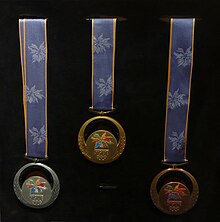User:Balester/History project
The Olympics
[edit]
The Olympics are the leading international sporting event featuring summer and winter sports competitions where thousands of athletes compete. The Olympic Games are considered the world's foremost sports competition with more than 200 nations participating.[1] The Olympic Games are held every four years, with the Summer Games and Winter Games alternating by occurring every four years but two years apart. Since 1994, the Summer and Winter Olympic Games have been held separately and have alternated every two years. [2] The Olympic competitions are intended to test the skill of individuals and teams, not nations. Therefore the IOC does not keep am official score among the nations. No country "wins" the Olympics. However, unofficially medal totals are calculated for the press and the public.[3]
Ancient and Modern days
[edit]Ancient days. It was a full moon of the time of Apollonius. The year 776 B.C., There was a race between two men. The race was beside a river called Alpheus, at Olympia. The winner, Coroebus. He was given a crown made of wild olive leaves, from the twigs that Hercules planted in a sacred groove near the Temple of Zeus. From then on Coroebus became nothing but a legend, just a story, on record. Thus the Olympic games were started.[4]Modern day. The Olympics have come a long way since the days at Olympia, Greece. The sports have also changed a lot. Today's sports include: Basketball, hockey, running, and water polo.[5] From 241 participants representing 14 nations in 1896, the Games have grown to about 10,500 competitors from 204 nations at the 2012 Summer Olympics. The Olympics have definitely grown.
Medal Presentation
[edit]
A medal ceremony is held after each Olympic event is concluded. The winners in individual sports are ranked first, second, and third. The medals are Gold, Silver, and Bronze, in that order.The winner, second and third-place competitors or teams stand on top of a three-tiered podium to be awarded their respective medals. In team sports, all the members of a winning team who have played in at least one of the games during the competition will receive a medal.
Summer and Winter Games
[edit]The Summer Games are held during the summer season of the host city, usually between July and October, and the last 17 days. Athletes compete in about 3,00 separate events during the Summer Games. A sport must be played in at least 75 countries before it is considered a men's competition. However, a sport must only be played in 40 sports for it to be considered a women's sport. The Summer Games have grown a lot. The Winter Games are usually held in February and the last 16 days. In the Winter Games a sport must be played in at least 25 countries and 3 continents to be considered an event. The Winter Olympics include over 75 events. The games attract approximately 2,000 athletes from more than 75 countries. [6]
IOC Rules for Citizenship
[edit]The Olympic Charter requires that an athlete be a national of the country of the country in which they compete for. Dual nationals may compete for either country if three years have passed since the competitor competed for the former country; if the NOCs and if involved agree, then the IOC Executive Board may reduce or cancel this period. This waiting period exists only for athletes who previously competed for one nation and want to compete for another. If an athlete gains a new or second nationality, then they need not wait any designated amount of time before participating for the new or second nation. The IOC considers only issues of citizenship and nationality after individual nations have granted citizenship to athletes. [7]
References
[edit]- ^ Prentice Hall: World History.Ellis. Print.
- ^ History.com, Olympic Games. History. com Staff. A and E Networks.
- ^ World Book Encyclopedia, Olypic Games. 746-756
- ^ The Story of the Olympic Games. by,John Kieran, and Arthur Daley. J.B Lippincott Company. 1965.
- ^ Pursuit of Excellence, The Olympic Story. Grolier Enterprises. 1979
- ^ World Book Encyclopedia,2005 edition, Volume 14. The Olympic Games. 746-756
- ^ "Olympic Games" Wikipedia. 14 March 2014. Web.
